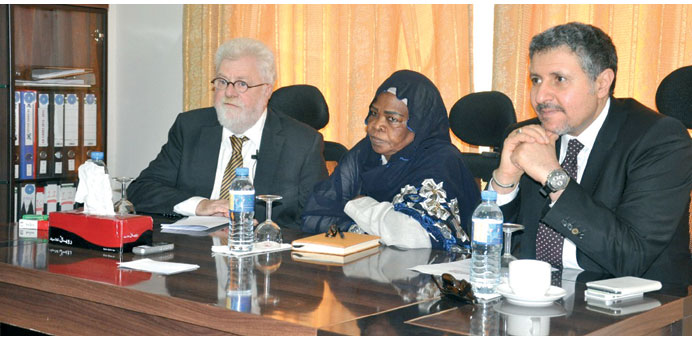Jan Keulen, director of the Doha Centre for Media Freedom (left), Afaf Tawer, chair of the Sudanese Parliamentary Media Committee (centre) and Nijad Bari, Egyptian academic and legal expert (right) talk about the Sudanese press law and recommendations produced by concerned experts and officials at a press conference held at the Centre.
By Hamza Jilani/Staff Reporter
The Doha Centre for Media Freedom (DCMF) concluded a two-day experts meeting on the Sudanese draft media law which sought to reform the crippling legislation by bringing together academics, government representatives and journalists to engage in discussions for new proposals and produce a set of recommendations.
The new draft is likely to be issued later this year.
“Qatar plays a big role in discussions and mediations across the Arab world from revolutions to peace missions and now [with the support of DCMF] to press freedoms,” said participant Nijad Bari, Egyptian academic and legal expert.
“Press freedom is an important pillar of democracy. Sudan is striving to be a freer and more democratic country and this is great that MPs are engaging in such talks with Doha support. Press freedom is the freedom of the country. We aren’t going to use our press freedom to cause problems or to hurt anyone. That’s not what freedom means. Press freedom means to have access of information and to be able to share it with audiences.”
While the meeting also aimed to ensure that the new law conforms to Article 39 of the Sudanese constitution, which stipulates that the new law must be similar to media laws in other democratic countries, participants shared different views about what freedoms and changes the nine resulting recommendations would bring about in the official talks.
Chair of the Sudanese Parliamentary Media Committee, Afaf Tawer, said that the strict press law within the austerity measures taken by the country was issued in 2009, it was “put into a transitional period which means that the current working constitution in Sudan of 2005 is transitional constitution and up for modification.
“The breaking away of southern Sudan, along with areas where there is still war and coupled with bad economy were all factors in limiting the press. Since the Arab Spring the government is trying to please the people and amend some laws – the draft press law is expected to be better,” Tawer said.
“My committee is only tasked to give recommendations; it is not our job to change it. I have given the draft of the law to many concerned parties and after the discussion I will collect the results for discussion. Let us be optimistic and think that things will be better after these recommendations are reviewed by parliament.”
The nine recommendations that were agreed on by the participants related to media immunity, access to information, right to opinion, legal punishments and other rights and responsibilities of press. The draft law has been dubbed by journalists as the “worst law ever” and has resulted in the permanent suspension of 2 newspapers and 12 reporters in the past two years, guaranteeing no immunity to investigative media workers, denying access of official information and statistics or the right to conflicting opinion to that of current Sudanese President Omar al-Bashir.
According to Sudanese correspondent at Al Sahafa newspaper Faysal Khalid, while the current press law and constitution, which stipulates in Article 38 that the law should be parallel to international press laws in other democratic countries, are bad, there are some current clauses and articles that can help press in Sudan. He says that the situation on the ground is much more complicated than changing what’s been written on paper.
“Our press council is set up by the government and operated by government officials, not journalists and forces in the authority are actively fighting local media. All this is against our written law and constitution,” he said.
“Yesterday my editor-in-chief Al Noor Ahmad al-Nour was permanently terminated from his job by two security officers because he wrote about the last coup attempt against Bashir which was legitimate news.”
Khalid added that suspended journalists like his boss face jail time in many cases but the suspensions are there to stay, forcing specialised workers into unemployment or behind the wheel of a taxi.
“They actually want to remove his name completely from the paper. This isn’t the role of the security forces, to go and fire people. How are we supposed to do our work?”

